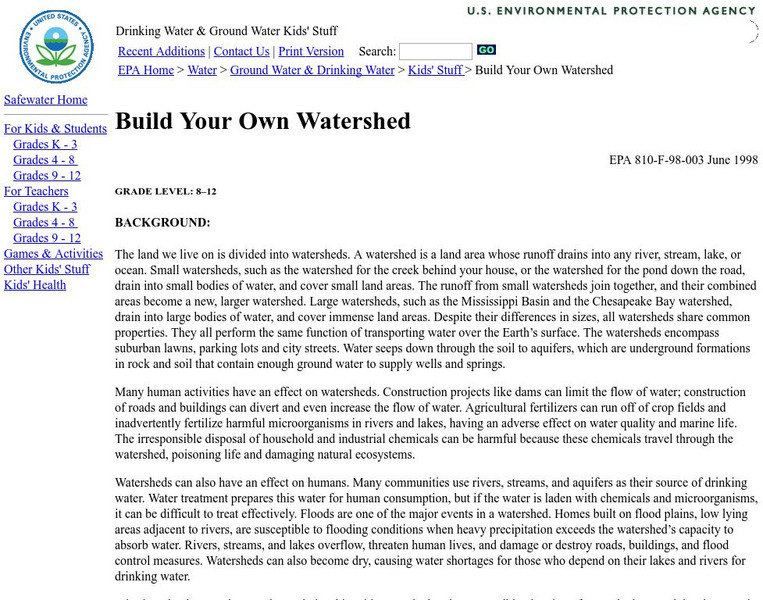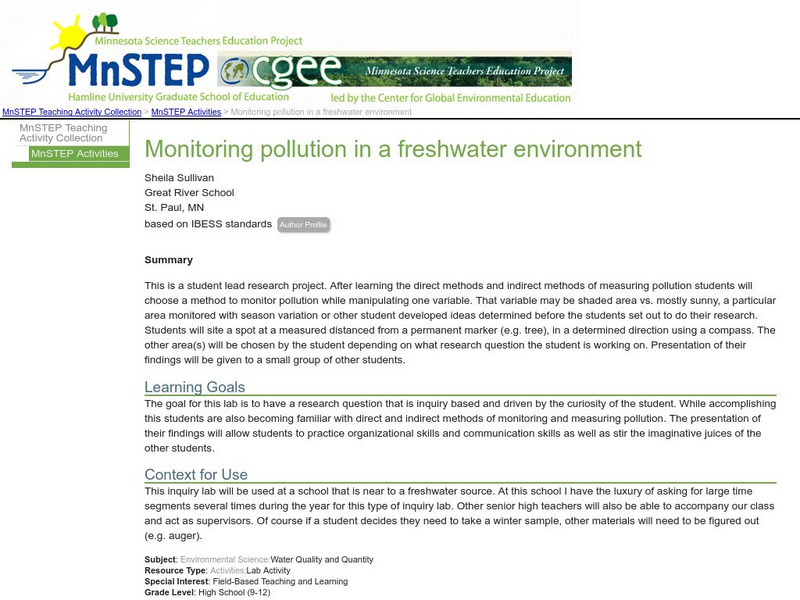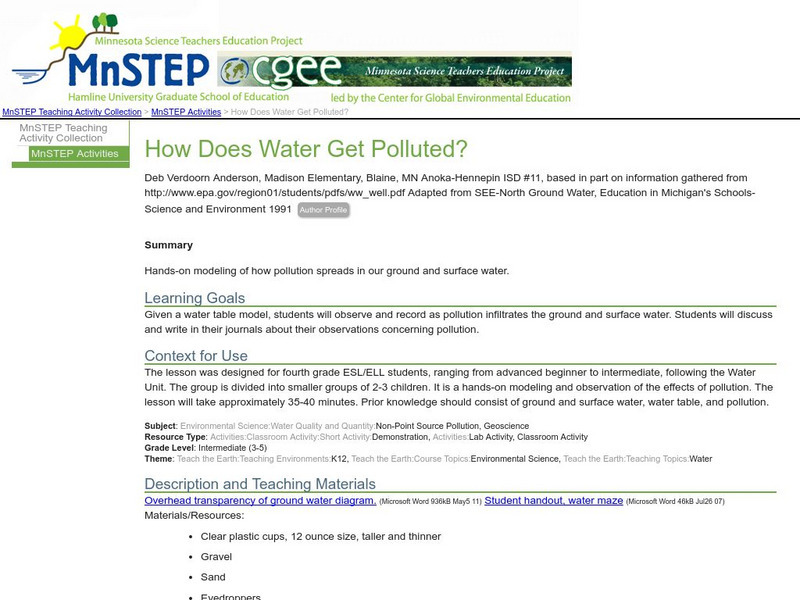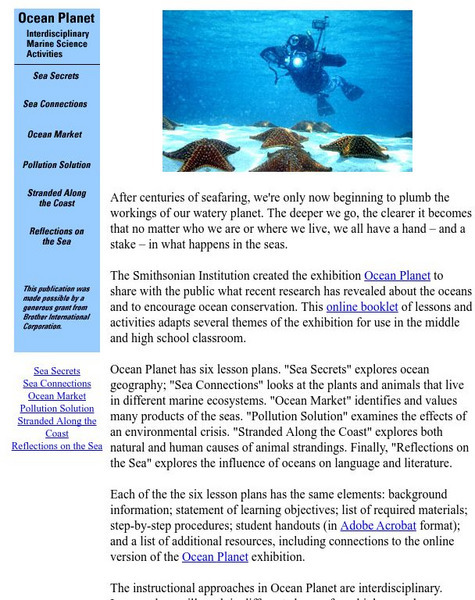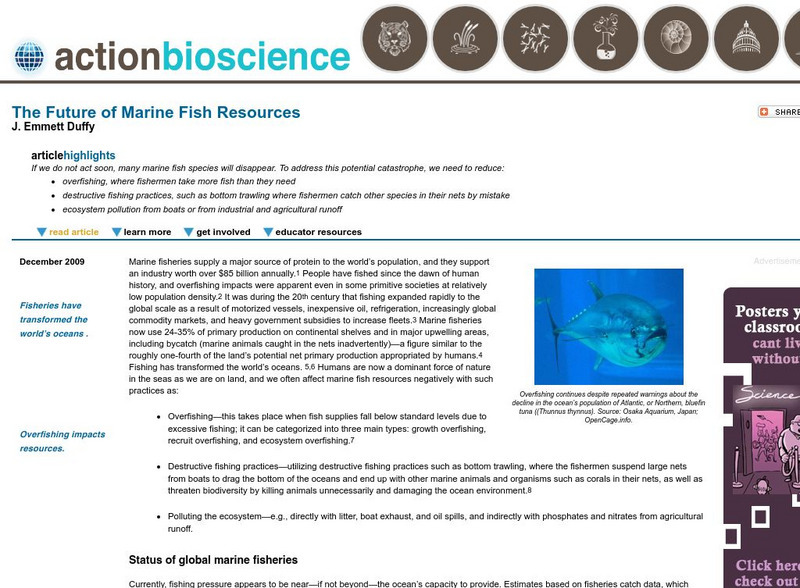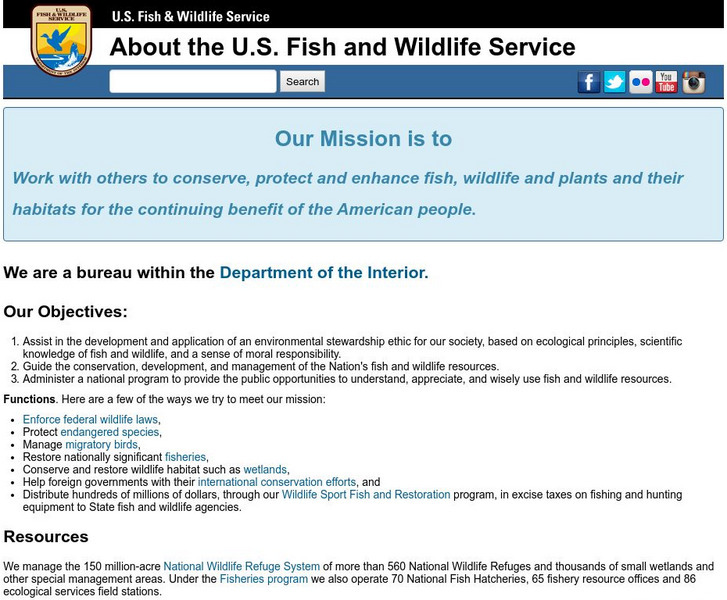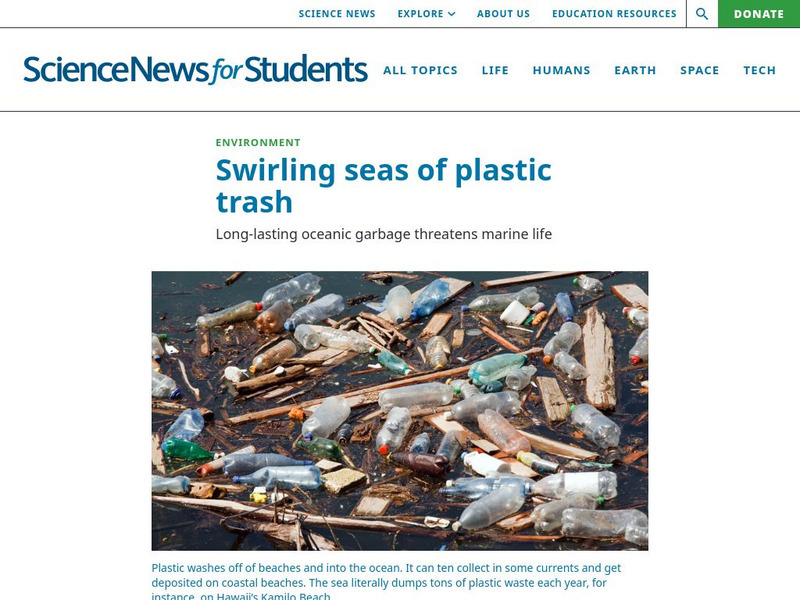BSCS Science Learning
Bscs: Heavy Metals in Waterways
This inquiry focuses on heavy metals in waterways in Colorado. Students will learn about heavy metals and data collected about them from citizen scientists, and then analyze the data in tables and maps to identify possible evidence of...
NOAA
Noaa: How Toxic Is It? [Pdf]
Experiment to find out how toxic various water samples are near you.
eSchool Today
E School Today: Your Cool Basics on Ocean Acidification
Looks at ocean acidification, what causes it, the impact of it, and possible ways to reduce it.
TED Talks
Ted: Ted Ed: Captain Charles Moore on the Seas of Plastic
Capt. Charles Moore discusses the growing problem of plastic trash in our seas and oceans and what the solutions might be. [7:24]
US Environmental Protection Agency
Epa: Build Your Own Watershed
How can you learn to build your own watershed? This site features an activity to illustrate the basic properties of a watershed. Don't miss out.
US Environmental Protection Agency
Epa: Secret of Bog Creek
This site has a user guided story about a bog that has been a secret dumping ground for waste.
US Environmental Protection Agency
Epa: A Kids Adventure Story
This cartoon describes what the EPA's Superfund is and how water can become polluted. A lab experiment with Q&A is included.
Science Education Resource Center at Carleton College
Serc: Disasters to Nature: Sensitivity of Ground Water Systems to Pollution
Learners visit three sites to investigate the areas where there is very high sensitivity for ground-water pollution. They also test the quality of water, measuring the dissolved oxygen, pH, total phosphate, nitrates, turbidity, and...
Science Education Resource Center at Carleton College
Serc: Using Benthic Marcoinvertebrates to Determine Biodiversity in a River
For this investigation of macroinvertebrates, students will build rock baskets and place them in various parts of a river to collect insects. Students will group insects according to their pollution tolerance and use the PTI to determine...
Science Education Resource Center at Carleton College
Serc: Investigate Effects of an Oil Spill
This lab is designed so that students will understand the effects of oil spills on plants, animals, and the environment and investigate clean up methods through a simulated oil spill. They will understand the risks associated with...
Science Education Resource Center at Carleton College
Serc: Monitoring Pollution in a Freshwater Environment
During this research project, students will choose either the direct method or the indirect method to monitor and measure pollution while manipulating one variable. They will develop a research question to work on and present their...
Science Education Resource Center at Carleton College
Serc: How Does Water Get Polluted?
Given a water table model, students will observe and record as pollution infiltrates the ground and surface water.
Science Education Resource Center at Carleton College
Serc: Can We Revive Lake Erie's "Dead Zone?"
This Ohio Sea Grant website features a WebQuest-like activity that explores the development of a dead zone, an oxygen-deprived area where there is no life, in Lake Erie. The activity aims to teach young scholars about the processes that...
Smithsonian Institution
Smithsonian Education: Ocean Planet
A series of lesson plans designed to be used with the Smithsonian Ocean Planet exhibit (available online). Lesson topics include marine ecosystems, pollution of ocean water, animal strandings, and literature.
Missouri Botanical Garden
Missouri Botanical Garden: Rivers and Streams
The Evergreen Project profiles the natural history of rivers and streams. Topics include watersheds, how a stream becomes a river, erosion, water pollution, and the like.
American Institute of Biological Sciences
Action Bioscience: The Future of Marine Fish Resources
An article and supporting resources address the potential of fish populations significantly decreasing with overfishing, careless fishing, and pollution from nautical vessels and runoffs.
Polk Brothers Foundation Center for Urban Education at DePaul University
De Paul University: Center for Urban Education: My Father's Miracle [Pdf]
"My Father's Miracle" is a one page, fictional, reading passage about a child who learned that his father was one of the people responsible for reversing the direction of the Chicago River, making it flow to the Mississippi instead of...
Missouri Botanical Garden
Missouri Botanical Garden: Water Pollution
Water pollution occurs when a body of water is adversely affected due to the addition of large amounts of materials to the water. The sources of water pollution are categorized as being a point source or a non-source point of pollution....
Text Project
Text Project: Fyi for Kids: Vol. 1, Issue 2: Going With the Flow [Pdf]
The article "Going with the Flow" is about water pollution and recycling. It explains what causes problems and what we can do about them.
NASA
Nasa: Creeping Dead Zones
Dead zones are popping up along coastlines all over the world. Find out what they are and the causes of this destructive phenomenon.
US Fish and Wildlife Service
U.s. Fish and Wildlife Service
Outlines the role of the Fish and Wildlife Service in protecting, conserving, and researching the fish and wildlife of the United States. Includes information about the role of DDT and its environmental effects.
Society for Science and the Public
Science News for Students: Cleaning Clothes Dirties Oceans
Describes research into the pollution caused by plastics that are hidden in the fibers of synthetic clothing, and eventually end up in the ocean after laundering. Cites other research that discovered plastic pellets found throughout the...
Society for Science and the Public
Science News for Students: Swirling Seas of Plastic Trash
Describes the multitude of plastic trash scientists have found on a beach in Hawaii and in the oceans. Explains what a gyre is, and how plastic trash gets trapped in the eye of a gyre. Looks at the serious impact plastic materials have...
Encyclopedia of Earth
Encyclopedia of Earth: Thermal Pollution
Article cites factors affecting temperature change of Earth's water and explains thermal pollution's impact on our planet's ecology.





